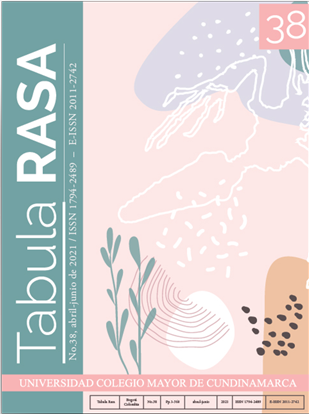Show authors biography
This article addresses urban citizenship from an anthropological perspective by combining the historical-structural account of oikos and polis as urban formations, along with an understanding relying upon the experience lived by actors who run arrends and provide their household with supplies. This research aims to describe how housewives move around daily spatialities in their stocking practices. The ethnographic observation of women’s practices and representations in a mining-industrial urban development marks to significant moments when running errands —going out and coming back to lock themselves in—, which reminds us of Arendt’s vita activa. These movements around urban space are analyzed as a sociocultural dynamic that I have called oikonization.
Article visits 101 | PDF visits 66
Downloads
- Arendt, H. (2009). La condición humana. Buenos Aires: Paidós.
- Aristóteles. (1988). Política. Madrid: Editorial Gredos.
- Benhabib, S. (2004). The right to have rights: Hannah Arendt on the contradictions of the nation-state. In The Rights of Others: Aliens, Residents, and Citizens (The Seeley Lectures, pp. 49-70). Cambridge: Cambridge University Press. doi:10.1017/CBO9780511790799.004
- Bowman, M. & Valk, U. (2014). Vernacular religion in everyday life. Expressions of belief. New York: Routledge.
- Debord, G. (2012). La sociedad del espectáculo. Buenos Aires: La Marca Editora.
- Galarza, B. (2020). El quilombo de la tele y su limpieza: una mirada antropológica a la pelea de gatos como tecnología del self en el oikos. Antípoda. Revista de Antropología y Arqueología, 38(1), 71-92.
- Girola, M. F. (2017). De la ciudadanía universal a la(s) ciudadanía(s) local(es). In Mediaciones De La Comunicación, 12(1), 155 - 177. https://doi.org/10.18861/ic.2017.12.1.2671
- Gramsci, A. (1971). Observaciones sobre el Folklore. En: Cultura y literatura (pp.329-336). Barcelona: Península.
- Gravano, A. (2019). Cauciones epistemológicas en el trabajo sobre imaginarios urbanos. En P. Vera, A. Gravano & F. Aliaga (Ed.), Ciudades (in)descifrables: imaginarios y representaciones sociales de lo urbano (pp.257-273). Bogotá y Tandil: Universidad Santo Tomás y Universidad del Centro de la Provincia de Buenos Aires.
- Guber, R. (2011). La etnografía. Método, campo y reflexividad. Buenos Aires: Siglo XXI.
- Hammersley, M. & Atkinson, P. (1994) Etnografía. Métodos de investigación. Barcelona: Paidós.
- Harvey, D. (2012). El enigma del capital y la crisis del capitalismo. Madrid: Buenos Aires.
- Jenofonte (1967). Económico. (Trad. y Ed. de Juan Gil). Madrid: Sociedad de Estudios y Publicaciones.
- Lazar, Sian. (2013a). The Anthropology of Citizenship. A reader. Boston and Oxford: Blackwells.
- Lazar, S.(2013b). El Alto: ciudad rebelde. La Paz: Plural.
- Little, A. (2002). The politics of community: Theory and Practice. Edinburgh: Edinburgh University Press.
- Marshall, T. H. & Bottomore, T. (1998) Ciudadanía y clase social, Alianza, Madrid.
- Marx, K. & Engels, F. (1968). La ideología alemana. Montevideo: Ediciones Pueblos Unidos.
- Sassen, S. (2002). The Repositioning of Citizenship: Emergent Subjects and Spaces for Politics. Berkeley Journal of Sociology, 46, 4-26. https://doi.org/10.1353/ncr.2003.0028
- Taussig, M. (1999). Defacement.Public secrecy and the labor of the negative. Stanford CA: Stanford University Press.
- Visacovsky, S. E. y Garguin, E. (comps.) (2009). Moralidades, economías e identidades de clase media. Estudios históricos y etnográficos. Buenos Aires: Antropofagia.
- Weber, M. (2002) Economía y sociedad. Madrid: Fondo de Cultura Económica. Yuval-Davis, N. (1997) Gender and Nation. London: Sage.




